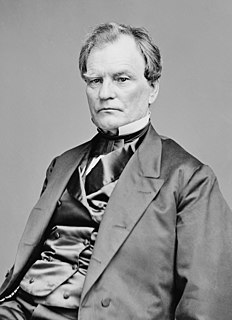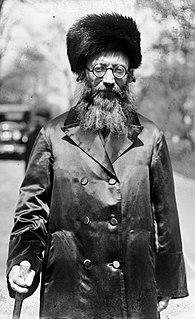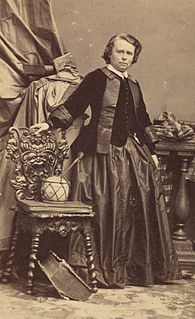A Quote by Benjamin F. Wade
If a man carries his horse out of a slave State into a free one, be does not lose his property interest in him; but if he carries his slave into a free State, the law makes him free.
Related Quotes
In the latter sense, a man has a property in his opinions and the free communication of them. He has a property of peculiar value in his religious opinions, and in the profession and practice dictated by them. He has an equal property in the free use of his faculties and free choice of the objects on which to employ them. In a word, as a man is said to have a right to his property, he may be equally said to have a property in his rights.
It is not the right of property which is protected, but the right to property. Property, per se, has no rights; but the individual - the man - has three great rights, equally sacred from arbitrary interference: the right to his life, the right to his liberty, the right to his property The three rights are so bound together as to be essentially one right. To give a man his life but to deny him his liberty, is to take from him all that makes his life worth living. To give him his liberty but take from him the property which is the fruit and badge of his liberty is to still leave him a slave.
Like the amazing story of Anthony Johnson. This man was a slave, then became free, accumulated 250 acres, and even had his own slave, a black man who took him to court in Virginia in 1654.That man argued that he should be freed like an indentured servant. But Johnson, who we believe was a pure African from Angola, said, "No way, you're my slave." And the court agreed.
Slowly but certainly the proletarian, by every political reform which secures his well-being under new rules of insurance, of State control in education, of State medicine and the rest, is developing into the slave, leaving the rich man apart and free. All industrial civilization is clearly moving towards the re-establishment of the Servile State.
Some souls think that the Holy Spirit is very far away, far, far, up above. Actually he is, we might say, the divine Person who is most closely present to the creature. He accompanies him everywhere. He penetrates him with himself. He calls him, he protects him. He makes of him his living temple. He defends him. He helps him. He guards him from all his enemies. He is closer to him than his own soul. All the good a soul accomplishes, it carries out under his inspiration, in his light, by his grace and his help.
To free a man from suffering, he must be set right, put in health; and the health at the root of man's being, his rightness, is to be free from wrongness, that is, from sin. A man is right when there is no wrong in him. I do not mean set free from the sins he has done: that will follow; I mean the sins he is doing, or is capable of doing; the sins in his being which spoil his nature — the wrongness in him — the evil he consents to; the sin he is, which makes him do the sin he does.
From the perfection of Allah's ihsan is that He allows His slave to taste the bitterness of the break before the sweetness of the mend. So He does not break his believing slave, except to mend him. And He does not withhold from him, except to give him. And He does not test him (with hardship), except to cure him.
It is Mind which determines the change of Society, and it was because the mind at work was a Catholic mind that the slave became a serf and was on his way to becoming a peasant and a fully free man-a man free economically as well as politically. The whole spirit of the Church was for small property, and that spirit was slowly, instinctively, working for the establishment of small property throughout Christendom.
For him who is perfect in love and has reached the summit of dispassion there is no difference between his own or another's, or between Christians and unbelievers, or between slave and free, or between male and female. But because he has risen above the tyranny of the passions and has fixed his attention on the single nature of man, he looks on all in the same way and shows the same disposition to all. For in him there is neither Greek nor Jew, male nor female, bond not free, but Christ who 'is all, and in all' (Col. 3:11; cf. Gal. 3:28).































